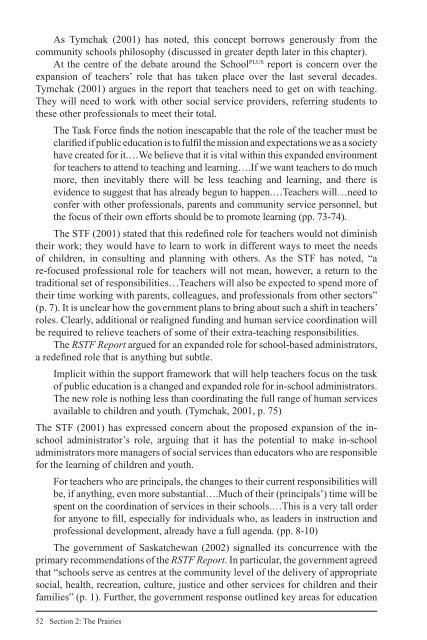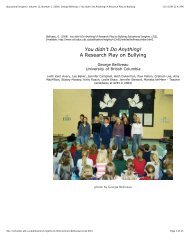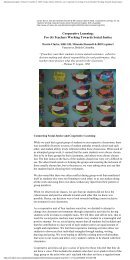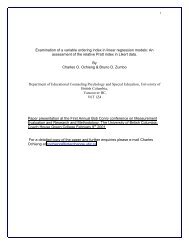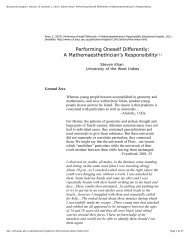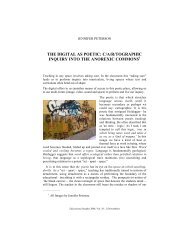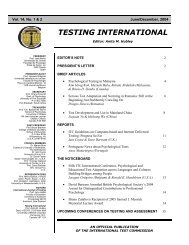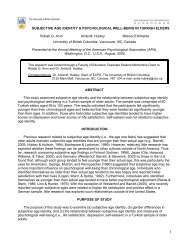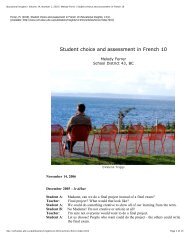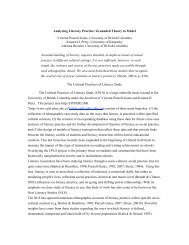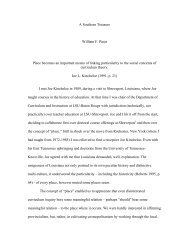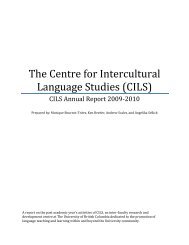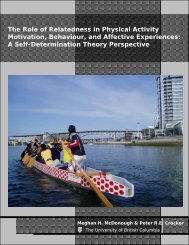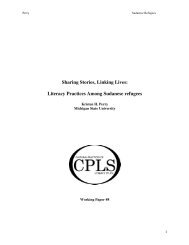The evolution of professionalism - Centre for Policy Studies in ...
The evolution of professionalism - Centre for Policy Studies in ...
The evolution of professionalism - Centre for Policy Studies in ...
You also want an ePaper? Increase the reach of your titles
YUMPU automatically turns print PDFs into web optimized ePapers that Google loves.
As Tymchak (2001) has noted, this concept borrows generously from the<br />
community schools philosophy (discussed <strong>in</strong> greater depth later <strong>in</strong> this chapter).<br />
At the centre <strong>of</strong> the debate around the SchoolPLUS report is concern over the<br />
expansion <strong>of</strong> teachers’ role that has taken place over the last several decades.<br />
Tymchak (2001) argues <strong>in</strong> the report that teachers need to get on with teach<strong>in</strong>g.<br />
<strong>The</strong>y will need to work with other social service providers, referr<strong>in</strong>g students to<br />
these other pr<strong>of</strong>essionals to meet their total.<br />
<strong>The</strong> Task Force fi nds the notion <strong>in</strong>escapable that the role <strong>of</strong> the teacher must be<br />
clarifi ed if public education is to fulfi l the mission and expectations we as a society<br />
have created <strong>for</strong> it.…We believe that it is vital with<strong>in</strong> this expanded environment<br />
<strong>for</strong> teachers to attend to teach<strong>in</strong>g and learn<strong>in</strong>g….If we want teachers to do much<br />
more, then <strong>in</strong>evitably there will be less teach<strong>in</strong>g and learn<strong>in</strong>g, and there is<br />
evidence to suggest that has already begun to happen.…Teachers will…need to<br />
confer with other pr<strong>of</strong>essionals, parents and community service personnel, but<br />
the focus <strong>of</strong> their own ef<strong>for</strong>ts should be to promote learn<strong>in</strong>g (pp. 73-74).<br />
<strong>The</strong> STF (2001) stated that this redefi ned role <strong>for</strong> teachers would not dim<strong>in</strong>ish<br />
their work; they would have to learn to work <strong>in</strong> different ways to meet the needs<br />
<strong>of</strong> children, <strong>in</strong> consult<strong>in</strong>g and plann<strong>in</strong>g with others. As the STF has noted, “a<br />
re-focused pr<strong>of</strong>essional role <strong>for</strong> teachers will not mean, however, a return to the<br />
traditional set <strong>of</strong> responsibilities…Teachers will also be expected to spend more <strong>of</strong><br />
their time work<strong>in</strong>g with parents, colleagues, and pr<strong>of</strong>essionals from other sectors”<br />
(p. 7). It is unclear how the government plans to br<strong>in</strong>g about such a shift <strong>in</strong> teachers’<br />
roles. Clearly, additional or realigned fund<strong>in</strong>g and human service coord<strong>in</strong>ation will<br />
be required to relieve teachers <strong>of</strong> some <strong>of</strong> their extra-teach<strong>in</strong>g responsibilities.<br />
<strong>The</strong> RSTF Report argued <strong>for</strong> an expanded role <strong>for</strong> school-based adm<strong>in</strong>istrators,<br />
a redefi ned role that is anyth<strong>in</strong>g but subtle.<br />
Implicit with<strong>in</strong> the support framework that will help teachers focus on the task<br />
<strong>of</strong> public education is a changed and expanded role <strong>for</strong> <strong>in</strong>-school adm<strong>in</strong>istrators.<br />
<strong>The</strong> new role is noth<strong>in</strong>g less than coord<strong>in</strong>at<strong>in</strong>g the full range <strong>of</strong> human services<br />
available to children and youth. (Tymchak, 2001, p. 75)<br />
<strong>The</strong> STF (2001) has expressed concern about the proposed expansion <strong>of</strong> the <strong>in</strong>school<br />
adm<strong>in</strong>istrator’s role, argu<strong>in</strong>g that it has the potential to make <strong>in</strong>-school<br />
adm<strong>in</strong>istrators more managers <strong>of</strong> social services than educators who are responsible<br />
<strong>for</strong> the learn<strong>in</strong>g <strong>of</strong> children and youth.<br />
For teachers who are pr<strong>in</strong>cipals, the changes to their current responsibilities will<br />
be, if anyth<strong>in</strong>g, even more substantial….Much <strong>of</strong> their (pr<strong>in</strong>cipals’) time will be<br />
spent on the coord<strong>in</strong>ation <strong>of</strong> services <strong>in</strong> their schools.…This is a very tall order<br />
<strong>for</strong> anyone to fi ll, especially <strong>for</strong> <strong>in</strong>dividuals who, as leaders <strong>in</strong> <strong>in</strong>struction and<br />
pr<strong>of</strong>essional development, already have a full agenda. (pp. 8-10)<br />
<strong>The</strong> government <strong>of</strong> Saskatchewan (2002) signalled its concurrence with the<br />
primary recommendations <strong>of</strong> the RSTF Report. In particular, the government agreed<br />
that “schools serve as centres at the community level <strong>of</strong> the delivery <strong>of</strong> appropriate<br />
social, health, recreation, culture, justice and other services <strong>for</strong> children and their<br />
families” (p. 1). Further, the government response outl<strong>in</strong>ed key areas <strong>for</strong> education<br />
52 Section 2: <strong>The</strong> Prairies


